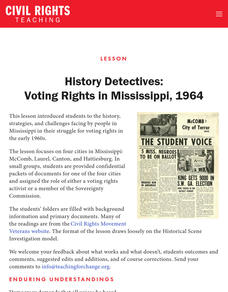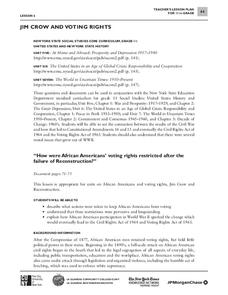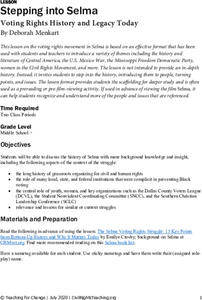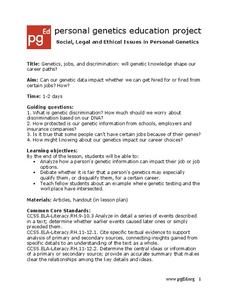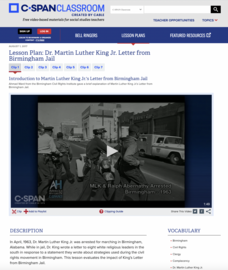K20 LEARN
Government and Your Right To Vote: Voting Rights In America
Gaining voting rights was difficult over the course of decades, but the debate over who should actually be allowed to cast a ballot remains. Scholars explore the history of the struggle, including the fifteenth and nineteenth amendments,...
Atlanta History Center
Civil Disobedience and the Atlanta Student Movement
What tactics are used in civil disobedience? Learners study the conditions in Alabama that led to the establishment of the Atlanta Student Movement, as well as consider the nature and effectiveness of civil disobedience.
C-SPAN
Last Days of Martin Luther King, Jr.
On April 4, 1968, Dr. Martin Luther King, Jr. was assassinated in Memphis, Tennessee. Four video clips reveal the events of that time, including the shift in the focus of the Civil Rights Movement, the aftermath of the assassination, and...
Alabama Department of Archives and History
The Wrong Side of History: How One Group Justified Its Opposition on the Freedom Riders and Civil Rights for African Americans
Designed as a supplement to the study of the Freedom Riders, this resource uses primary sources to reveal the views of those who opposed the Freedom Riders. After careful study of the arguments presented by the members of the Montgomery...
Stanford University
Lesson Plan: The Children's Crusade and the Role of Youth in the African American Freedom Struggle
Young people played significant roles in the Civil Rights movement. Class members examine the contributions of Barbara Johns, Claudette Colvin, Mary Louise Smith, and the children of Birmingham,...
Teaching for Change
History Detectives: Voting Rights in Mississippi, 1964
Promises made and promise broken. Spies and activists. Voting rights in Mississippi are the focus of a lesson that has class members research the history of the struggle in Mississippi. Learners take on the role of voting rights...
PBS
Jackie Robinson: Athlete and Activist
Can hitting a home run be an act of courage? Scholars analyze the impact Jackie Robinson had on the Civil Rights movement in America. They use primary sources and video clips to create 21st-Century baseball cards of Robinson's many...
Constitutional Rights Foundation
Suppressing the Vote
Voting rights have expanded over time, but some voters are still being suppressed. A thought-provoking resource explores the history of voter suppression in the US and efforts to remove roadblocks to voting. Young historians learn about...
PBS
March on Washington: A Time for Change
Young historians conclude their study of the events that lead up to and the planning for the March on Washington. After examining videos and primary source documents, they consider the civil rights objectives that still need to be...
Curated OER
Martin Luther King and Malcom X on Violence and Integration
Dr. Martin Luther King and Malcolm X were contemporaries. Both were gifted orators, both were preachers, both were leaders during the Civil Rights era, both were assassinated. But the two had very different views on violence and...
K20 LEARN
LBJ and Voting Rights
Challenges to voting rights is not a new thing. Using President Lyndon B. Johnson's 1965 "The American Promise" speech on voting rights as a starting point, young historians research current voting rights laws and challenges.
City University of New York
Jim Crow and Voting Rights
Class groups examine primary source documents to determine how the voting rights of African Americans were restricted after the failure of Reconstruction, and how African American participation in World War II lead to change.
Center for Civic Education
Citizenship Schools and Civic Education During the Civil Rights Movement and in the Present
Your young historians will discover the importance that citizenship education has played in the social progress of the United States as they learn about early efforts to discourage African Americans from voting in the 1960s.
Teaching for Change
Stepping into Selma
The 1964 Selma to Montgomery, Alabama voting rights marches are the focus of a lesson designed to introduce learners to people who took part in the Civil Rights Movement. Class members set into the role of one of the participants,...
Described and Captioned Media Program
Malcolm X: Make It Plain, Part II
Track the transformation of Malcolm Little into Malcolm X and then into El Jajj Malik El-Shabazz with the second part of Make it Plain, a documentary on the famous civil rights activist. Viewers consider not only how events shaped and...
Teaching Tolerance
Using Photographs to Teach Social Justice | Confronting Unjust Practices
A powerful photograph of the Freedom Riders of 1961 launches an examination of the de jure and de facto injustices that the civil rights movement of the 1950s and 1960s addressed. Young historians first watch a video and read the Supreme...
Teaching Tolerance
The True History of Voting Rights
Explore what voting rights really are in an intriguing lesson plan that explores the history of American voting. The resource examines the timeline of voting rights in the United States with group discussions, hands-on-activities, and...
Personal Genetics Education Project
Genetics, Jobs and Your Rights
Your class will read an overview of the Genetic Information Nondiscrimination Act, passed in 2008 and address the question of whether or not genetic information should be used to influence our career paths. In jigsaw style, they then are...
PBS
Out of the Shadows | Black America Since MLK: And Still I Rise
Two powerful video clips launch a study of race relations in the United States after the Selma, Alabama riots, the passage of the Votings Rights Act, and the riots in Watts, California.
Museum of Tolerance
Making Lemonade: Responding to Oppression in Empowering Ways
An activity focused on tolerance encourages class members to consider how they might respond when they or someone else is the target of oppression and discrimination. After researching how some key figures responded to the anti-Semitism...
Carolina K-12
African Americans in the United States Congress During Reconstruction
The Civil Rights Act of 1866, which granted citizenship to all males in the U.S., resulted in the first African Americans to be elected to Congress. Class members research 11 of these men, the challenges they faced, and craft...
C-SPAN
Dr. Martin Luther King Jr.'s Letter from Birmingham Jail
Timing is everything. Introduce young historians to Dr. Martin Luther King, Jr.'s "Letter from Birmingham Jail" with a resource that underscores the significance of the timing of the Good Friday Birmingham march, King's subsequent...
Anti-Defamation League
Shirley Chisholm: Unbought, Unbossed and Unforgotten
A 13-page packet introduces high schoolers to a lady of amazing firsts. Shirley Chisholm was the first Black woman elected to Congress, the first Black woman to run for President of the United States, and a leader of the Women's Rights...
University of Arkansas
Promises Denied
"Promises Denied," the second instructional activity in a unit that asks learners to consider the responsibilities individuals have to uphold human rights, looks at documents that illustrate the difficulty the US has had trying to live...
Other popular searches
- Civil Rights Act 1964
- Civil Rights Act of 1964
- Civil Rights Activism
- Civil Rights Act 2001
- Civil Rights Act Canada
- Civil Rights Act 1965
- Civil Rights Act 1866
- Civil Rights Act 1968
- Civil Rights Activists
- Civil Rights Act of 1866
- Jewish Civil Rights Activists
- Civil Rights Activities







